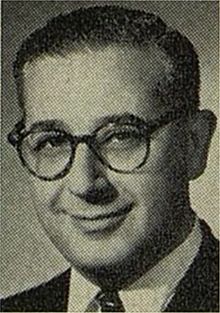| Philip Ned Krasne | |
|---|---|
 | |
| Born | May 6, 1905 Norfolk, Nebraska, US |
| Died | September 18, 1999 Los Angeles, California, US |
| Nationality | American |
| Alma mater | University of Michigan USC Gould School of Law |
| Occupation(s) | Film and television producer |
| Known for | The Cisco Kid (TV series) |
| Spouse | Bernice F. Krasne (m. 1930-1997, her death) |
Philip N. Krasne (May 6, 1905 - September 18, 1999) was an American attorney who became a film and television producer.
Early years and education
Krasne was the son of Herman J. Krasne, a clothing merchant, and Rose Bernstein, Polish immigrants from Bialystok. The youngest of three brothers, Philip graduated from Abraham Lincoln High School in Council Bluffs, Iowa, where Herman was an owner of People's Department Store. In 1927, Philip Krasne graduated from the University of Michigan, which awarded him both its Chicago Alumni Medal and Paul Gray Testimonial for excellence in oratory. He received his LLB degree from the University of Southern California School of Law. He was admitted to the bar in 1929.
Producer
In 1936, Krasne began his motion picture career as vice-president in charge of production at Grand National Films Inc. In 1943 he teamed with James S. Burkett to produce features for Monogram Pictures: three with burlesque star Ann Corio, and three Charlie Chan mysteries. Burkett went on to produce the Chan pictures on his own, while Krasne initiated two more series for Monogram: musical westerns with Jimmy Wakely, and western adventures with Gilbert Roland as O. Henry's famous character The Cisco Kid.
Krasne retained the film rights to The Cisco Kid and produced another series of theatrical features for United Artists release, now starring Duncan Renaldo. Krasne brought The Cisco Kid to television, filming half-hour episodes of The Cisco Kid in color, again with Renaldo. This was before broadcasting in color was perfected, and Krasne shrewdly anticipated that the color shows would become more valuable in the future.
In 1952 Krasne joined former Universal Pictures producer Jack J. Gross to form Gross-Krasne, Inc, a pioneer American independent producer of television films. They produced, among other programs, Big Town and Mayor of the Town. In 1957, Krasne spent two months in Africa with Kenya Productions, Ltd, arranging the filming of two African television series, African Patrol and The Adventures of a Jungle Boy. In 1952, Gross-Krasne bought the California Studios (now the Raleigh Studios) where many of their productions were filmed.
Later life
Krasne produced his last film in 1974. He died in Los Angeles in 1999.
Selected filmography
- Fighting Mad (1939)
- Crashing Thru (1939)
- Danger Ahead (1940)
- Murder on the Yukon (1940)
- The Sultan's Daughter (1943)
- Sarong Girl (1943)
- Song of the Range (1944)
- Charlie Chan in the Secret Service (1944)
- The Chinese Cat (1944)
- Black Magic (1944)
- The Valiant Hombre (1948)
- The Daring Caballero (1949)
- Satan's Cradle (1949)
- The Girl from San Lorenzo (1950)
- Pawnee (1957)
- The Boy Cried Murder (1966)
References
- Herman Krasne dies in California. Omaha World Herald. November 9, 1951
- University of Michigan. General Register. 1926, Page 184
- Anthony Slide. The television industry: a historical dictionary. Greenwood Press, 1991 p 125
- "Cisco Kid" for TV Via Pact With Ziv. The Billboard (Archive: 1894-1960)61.39 (Sep 24, 1949): 47
- Film: Gross-Krasne Expands With 'O. Henry' Success. Broadcasting, Telecasting (Archive: 1945-1957) 51.22 (Nov 26, 1956):66.
- FILM: Why they shoot films overseas, and why saving money isn't why. Broadcasting (Archive: 1957-1993)54.22 (Jun 2, 1958): 54.
- Gross-Krasne Buys California Studios. The Billboard (Archive: 1894-1960)64.40 (Nov 29, 1952): 11
- 1905 births
- 1999 deaths
- American film studio executives
- California lawyers
- USC Gould School of Law alumni
- University of Michigan alumni
- Film producers from California
- Television producers from California
- People from Norfolk, Nebraska
- 20th-century American businesspeople
- Burials at Hillside Memorial Park Cemetery
- 20th-century American lawyers